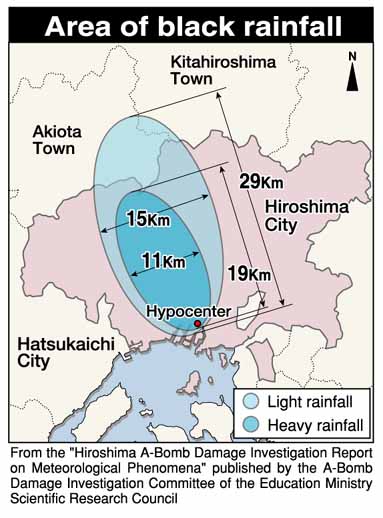Survey of 30,000 A-bomb survivors to be carried out by Hiroshima
Feb. 15, 2008
by Hiromi Morita, Staff Writer
In the next fiscal year starting in April 2008, the city of Hiroshima will conduct another survey involving the psychological impact on recognized hibakusha (A-bomb survivors) and others exposed to the “black rain” which fell in the immediate aftermath of the bombing. Tentatively known as the “Health Survey of People Who Experienced the Atomic Bombing,” the study will include approximately 30,000 people, making it a large-scale survey. The city plans to assess “emotional traumas” through medical evaluation, including posttraumatic stress disorder (PTSD), and urge the central government to strengthen relief measures based on the findings.
In fiscal 2002, the city conducted a similar survey, which covered 10,000 people, and concluded that those who saw the bomb’s flash, or were caught in the black rain--whether or not they have been officially recognized as A-bomb survivors under the Atomic Bomb Survivors Relief Law--were more likely to complain of physical and mental health effects than those who did not. The central government, however, rebuffed the city’s findings and did not acknowledge the need to expand the scope of relief measures, contending that “the findings do not constitute acceptable scientific grounds.” This outcome has led the city to move ahead with the additional survey in which the methodology is revised and the number of participants increased.
In the new survey, about 30,000 people who have lived in the city since 1945 to the present day, including 20,000 hibakusha, will be asked to respond to a questionnaire by post. The questionnaire will seek information related to the person’s experiences in terms of the atomic bombing, the black rain, and personal health. Among the respondents, about 2,000 people will then be selected for individual interviews with medical doctors and clinical psychotherapists.
In conjunction with this survey, the city will also gather data on the effects of internal exposure by radioactive fallout and low-dose irradiation on the human body.
To conduct the survey, the city will set up a study group consisting of 10 experts in such fields as psychiatry and epidemiology to discuss specific procedures. If the survey determines that the bombing had impact across a wider area than currently recognized, the city will urge the central government to expand its relief measures for survivors.
The city has allocated 43 million yen to carry out the survey and related research. The survey is also considered significant in terms of passing on the experience of the atomic bombing to future generations as this will likely be one of the last opportunities to hear the personal accounts of aging survivors who have direct experience of the atomic bomb.
In the next fiscal year starting in April 2008, the city of Hiroshima will conduct another survey involving the psychological impact on recognized hibakusha (A-bomb survivors) and others exposed to the “black rain” which fell in the immediate aftermath of the bombing. Tentatively known as the “Health Survey of People Who Experienced the Atomic Bombing,” the study will include approximately 30,000 people, making it a large-scale survey. The city plans to assess “emotional traumas” through medical evaluation, including posttraumatic stress disorder (PTSD), and urge the central government to strengthen relief measures based on the findings.
In fiscal 2002, the city conducted a similar survey, which covered 10,000 people, and concluded that those who saw the bomb’s flash, or were caught in the black rain--whether or not they have been officially recognized as A-bomb survivors under the Atomic Bomb Survivors Relief Law--were more likely to complain of physical and mental health effects than those who did not. The central government, however, rebuffed the city’s findings and did not acknowledge the need to expand the scope of relief measures, contending that “the findings do not constitute acceptable scientific grounds.” This outcome has led the city to move ahead with the additional survey in which the methodology is revised and the number of participants increased.
In the new survey, about 30,000 people who have lived in the city since 1945 to the present day, including 20,000 hibakusha, will be asked to respond to a questionnaire by post. The questionnaire will seek information related to the person’s experiences in terms of the atomic bombing, the black rain, and personal health. Among the respondents, about 2,000 people will then be selected for individual interviews with medical doctors and clinical psychotherapists.
In conjunction with this survey, the city will also gather data on the effects of internal exposure by radioactive fallout and low-dose irradiation on the human body.
To conduct the survey, the city will set up a study group consisting of 10 experts in such fields as psychiatry and epidemiology to discuss specific procedures. If the survey determines that the bombing had impact across a wider area than currently recognized, the city will urge the central government to expand its relief measures for survivors.
The city has allocated 43 million yen to carry out the survey and related research. The survey is also considered significant in terms of passing on the experience of the atomic bombing to future generations as this will likely be one of the last opportunities to hear the personal accounts of aging survivors who have direct experience of the atomic bomb.








